 |
 |
 |
 |
 |
 |
 |
 |
 |
Inter Cities Fairs Cup first round second leg - Elland Road - 24,178
Scorers: Charlton 52 min, Lorimer 75, Bremner 88
Leeds United: Sprake, Reaney, Cooper (Bates 45), Bremner, Charlton, Hunter, O'Grady, Lorimer, Jones, Madeley, Hibbitt (Gray 70)
Standard Liege: Nicolay, Blaise, Thissen, Dewalque, Jeck, Pilot, Semmeling, Van Moer, Galic, Kostedde, Depireux
Standard coach, Roger Petit, spoke almost humbly before the teams met.
'I suppose this game has come too early for us. It would be much better
to have met Leeds in the semi final or the quarter final, but seeing the
cup holders will be a treat for our supporters.' Though the standard of Belgian football was much lower than in England,
and United's dominance of the Fairs Cup since 1965 had been a wonder to
behold, Petit's words smacked of a psychological attempt to lull United
into complacency. Standard had adapted well to the loss of Roger Claessen, who had been
Belgium's top scorer in 1968 and left in the close season to join Alemania
Aachen in West Germany. Even without Claessen, Liege were on their way
to recapturing the Belgian title at the time. They were undoubtedly a strong outfit, boasting a wonderful attack. 22-year-old
striker Erwin Kostedde (who became the first black West German international
in 1974) was Claessen's replacement, joining the club from Duisburg. He
was Belgium's top scorer with 26 goals in 1971. Antal Nagy played in the
World Cup finals for Hungary in 1966 and went on to be top scorer in Belgium
that season; Nagy played in the first leg, but was replaced for the Elland
Road game by the Yugoslav international Milan Galic, who came to fame
with Partizan Belgrade and won a gold medal at the Olympic Games in 1960. In midfield they had the Belgian internationals Leon Semmeling (the skipper)
and Wilfried Van Moer (92 caps between them), along with Louis Pilot,
generally rated Luxembourg's best ever player, winning 49 caps between
1959 and 1971. Van Moer was the pick of the bunch. He won the Belgian
Golden Shoe three times and was a mainstay of the Belgium team from 1966
to 1982. He had been signed by Standard at the start of the season after
quitting relegated Royal Antwerp. The rearguard, too, was redoubtable: Don Revie had promised to attack
in the first leg in Belgium, but United had to be content with a goalless
draw in the Sclessin Stadium. Leeds were forced to rely on a classic stone
walling defensive display as Standard continually pushed them back. A
sterling performance by Gary Sprake was crucial. Phil Brown in the Yorkshire Evening Post: 'Sprake had a positively
inspired 20 minutes in the first half and was perfectly competent in the
other 70 minutes. His rainbow 20 minutes got him round after round of
applause although he was frustrating the strong and clever home forwards
after they had interpassed or dribbled their way into United's box. They
finished off with cracking shots too, but Sprake was just unbeatable.
He had to face a barrage of shots from close range, but his responses
were electrifying. High and low he soared or dived in panther-like style,
and three times he kept the ball out of the angle only by acrobatics.
But his best save, for it involved leaving the play and anticipating together
with other virtues, was a racing run out and dive on to Nagy's shooting
foot as he cracked in a perfect centre from Semmeling. Once Reaney's head
saved for Sprake, once the home centre-forward Kostedde blasted the bar
with a cannonball drive, but Sprake deserved the help and the luck he
got in those moments. 'The game would have been a better spectacle - the capacity 35,000 crowd
was quiet for long periods - if United had opened up or rather if they
could have risked opening up. Open up they must and will at Leeds, but
their forwards, lion-hearted Jones apart, carried little thrust after
the first 10 minutes, during which they briskly won three corners. The
big home defence lay too heavily - sometime literally - on them after
that, although Jones, shooting out of a tackle, had a 15-yard drive deflected
on to the bar.' Don Revie said after the game: 'I thought Standard played some good football
until 15 minutes before half time. In the second half our defence was
magnificent. I am very pleased with the result and I think we have got
a good chance at Leeds. I feel confident.' Roger Petit: 'I thought it was a hard game, perhaps too hard. We had
hoped to go to Leeds with one or two goals. Naturally this is a very good
result for Leeds.' United had started the season well and were confident that they would
have enough in the Elland Road locker to clinch the second leg and the
tie. They did have the worry of going into the match on the back of two
defeats, against Second Division Crystal Palace in the League Cup and
then by 5-1 away to Burnley, but argued that
lightning could not possibly strike THREE times! The match kicked off late after a controversial prelude. United had already
been awaiting the entrance of Standard Liege for five minutes and were
shocked when they then trotted out in pristine white, sparking fifteen
minutes of heated argument. Standard's normal strip was red shirts and white shorts, which they had
worn in Belgium. For some strange reason they chose to come to Leeds with
only an all-white kit, even though they knew there would be a colour clash.
Billy Bremner pointed out the problem to referee Gunnar Michaelson, who
asked Standard to change strip. With Don Revie and Roger Petit arguing
bitterly in the tunnel about who should change, matters became farcical. The Belgian party argued that they only had the white strip with them
and that the rules made it clear that the onus was on the home team to
change. United accepted the point, but asserted that Standard had caused
the problem by their strange choice of kit. United's change strip of all
blue was offered to the Belgians, but they claimed angrily that it did
not fit and blatantly ignored the officials' decree that they should change. In an irritable acceptance that something would be needed to break the
deadlock, Leeds eventually accepted that someone would need to compromise
and they agreed to play in blue. There were actually three teams at Elland Road that night wearing white,
as remembered by Rick Duniec, the former chairman of Leeds United Supporters'
Trust: 'I was there. The referee was trying to get the team to kick off,
and it was Bremner pulling at his sleeve and pointing out that they'd
all got white shirts on, both sides. What people don't know is you're
at Elland Road, you see white shirts in the tunnel, crowd starts going
mad. These guys run out, and it was all Leeds students for rag week, with
"Leeds Rag Week" on the back of their shirts. So, the crowd had got all
excited, they'd realised it was some kind of stunt. It was a promotion
for Leeds rag week. They go in, and then, only then, did both teams come
out wearing white. So there were three teams out in white that night,
not two.' Finally released from the trivia of the argument, United showed their
relief by getting instantly into gear and forcing Standard back onto defence.
The home crowd hooted them with derision, both for their pre-match pettiness
and for some rough play. Eric Stanger in the Yorkshire Post: 'They were loudly booed, not
only before a ball was kicked, but for a succession of fouls in their
efforts to stem United's all out bid for an early goal. The nearest Leeds
came to one was when Cooper burst through the middle, beat off four tackles
only for Nicolay to bring off a fine save. That apart, Liege, through
the sterling covering of their back four - Blaise, Thissen, Dewalque and
Jeck - kept them either at long range or effectively crowded them out
when Charlton and Jones took to the air from corners and free kicks.' Leeds were without Johnny Giles, who had failed to recover from a knock
on the thigh at Burnley, and they missed his subtlety and eye for the
opportunity. Standard were in fine form, O'Grady saw his snap shot well held by goalkeeper Nicolay, who then saved
from Mick Jones' smart header. United were tending to rush their work in an eagerness to attack and
displayed none of their customary coolness. They were a side better equipped
to sit on a lead than chase a game. The gung ho approach was always likely
to leave openings at the back and Leeds were found badly wanting at the
end of the half. A minute before the interval the worst happened. Standard had shown impressive
speed on the break on several occasions, with Erwin Kostedde a constant
threat. Jack Charlton, displaying
a lack of concentration, was guilty of a loose pass which was picked up
by Van Moer, then fed on to Galic. With the United rearguard out of position,
a fine though ball exploited the gap, sending Kostedde clear down the
middle. He hurdled two strong tackles to get in a shot, which Gary Sprake
blocked. Kostedde reacted more quickly than the chasing Cooper and Reaney
to fire home at the second time of asking. Cooper had been nursing an ankle injured at Burnley and did not come
out for the second half. He was replaced by Mick Bates, with Paul Madeley
moving to left-back. The switch did nothing to calm their defensive anxiety
and Leeds were suddenly facing an uphill struggle. Six minutes had gone in the second half when the visitors launched another
swift break. The Leeds defence was guilty of more slack marking and slow
challenges, when a through ball down the left channel put Galic in the
clear. He added the second goal with clinical efficiency, leaving Sprake
clutching at air. It was a devastating blow. With the Burnley debacle fresh in their minds,
United could have been excused for buckling at that stage and accepting
defeat gracefully. With away goals counting double, they needed three
goals to stay in the competition and it was a mighty big ask. Whether they would have been able to recover anything other than pride
if they had been given pause to reflect on the size of the challenge is
anybody's guess. Suitably revived, Leeds attempted to build on their precarious foothold,
committing everything to attack. They continued to take wild risks, leaving
themselves open to the distinct possibility of conceding a third. The
speedy Standard raiders exploited the space - Depireux struck an upright
and then Reaney was forced to head another effort off the line. The wave of United attacks seemed to be running out of steam when Eddie
Gray was called from the bench after 70 minutes. He replaced the disappointing
Terry Hibbitt who had been kicked
on the thigh. Gray added fresh legs to the onslaught and ran meaningfully
at the Belgian defence. His skill brought anxiety where there had previously
been calm assurance and promised new hope. Gray was fouled within minutes
of entering the fray to earn a free kick in a position that was perfect
for a man of Peter Lorimer's shooting prowess. He needed no second bidding
and hammered the dead ball low and true from 25 yards. It pierced a disintegrating
wall and beat Nicolay's dive to bring the scores level on the night. Their two away goals left Standard with the advantage, but the strike
brought fresh impetus to the Leeds revival. They kept plugging away, seemingly convinced that victory was written
in the stars. Nevertheless, as the clock ran down, it looked like Liege
would have enough, either nous or luck, to secure an impressive victory.
United had not managed more than two goals in a game since they had beaten
Ipswich 3-2 in August and were distinctly lacking a Jimmy Greaves or Geoff
Hurst type to apply the rapier finish to their grinding attacks. A disappointing
inability to turn possession and territorial advantage into goals looked
to be a critical weakness. But three testing years of competition against the very best the Fairs
Cup had to offer had honed United's play. They had triumphed against the
odds before and had a blinding conviction that things were never over
until the final whistle. They battled on manfully, pinning Liege back
into their final third, seeking to roll them over on the strength of guts
alone. There were barely two minutes remaining when continuing Leeds pressure
forced a corner on the left. Lorimer took the kick and floated it to the
heart of the Standard area. Jack Charlton, in his customary position on
the goal line, got to the ball and flicked it down. Billy Bremner had
always had the knack of scoring goals in big games and was not found wanting
on this occasion. He had been thrust forward for most of the second half
as support to Mick Jones and was now in the perfect spot to stab the ball
home for an unlikely winner. Elland Road went wild with excitement and
relief. It was the most dramatic of goals, crowning one of United's most
spectacular European nights. Phil Brown in the Yorkshire Evening Post: 'After a cliff hanger
with a drop as deep as the Eiffel Tower is high, Leeds United beat Standard
Liege 3-2 at Elland Road in United's most exciting Fairs Cup-tie yet.
It seems incredible that they can have a harder match in their defence
of the trophy, and no congratulations can be too warm. 'Even Don Revie, whose determination and optimism matches his side's,
had inwardly given up hope, he told me. But on the field, with skipper
Bremner doing an heroic job of leadership by example, the side battled
on. 'I have often written these last few years of their bottomless grit and
courage against high odds, but this was their Eric Stanger wrote a cautionary piece for the Yorkshire Post in
the days after the game, reflecting on the brittle nature of success: 'When Bremner scored his dramatic goal two minutes from the end of time
against Standard Liege at Elland Road, I was just about to begin my report
by saying that in the space of eight days Leeds United's cosy little world
had tumbled about their ears. Such is the narrow margin between success
and failure. To be put out of the Inter Cities Fairs Cup on top of the
Football League Cup, after holding both trophies, would not only have
been a serious setback to a side still struggling to find normal form
but could well have meant a total loss of revenue from the two competitions
of £50,000 or more. 'While Leeds United's finances have taken a startling turn for the better
since the days when they were in debt to the tune of £135,000, they are
still not a rich club, not in terms of such as Manchester United, Liverpool,
Tottenham Hotspur and Everton. And there is a new £200,000 stand to pay
for. 'One of the things which must worry the board is how stout is their present
support. The Leeds crowd was always more fickle than most and while the
average attendance has doubled since they began their successful run five
seasons ago, would it stand up to a period of failure after being fed
on so much success? 'I pose the question rather than attempt to answer it but there may have
been a clue in the comparatively meagre 24,178 attendance against Standard
Liege. There was no price increase quarrel between supporters and club
this time as there was against Ferencvaros. Mr Keith Archer, the general
manager, yesterday was inclined to blame the threat of fog for keeping
the crowd down. But I have an idea that the defeat at Crystal Palace plus
the trouncing at Burnley kept quite a lot at home. 'Of course, the public are quite entitled to stay away if they do not
think they are getting value for money and being a supporter today is
an expensive business even if 'That is why increasingly football followers demand success. If they
cannot find it in their own town, in these days of quick easy transport
they will go elsewhere. 'It is also the reason why such clubs as luckless Bradford, so deep in
debt, cannot get out of the red because they have not the money to spend
on building a better team, while it makes clubs like Leeds United prisoners
of their own success. They just cannot afford many failures. 'Not that I think there will be a real slump at Elland Road. After all
they still lead the First Division and any side off form which can fight
as they did against Standard Liege cannot take a lot of harm. They have
too many talented players not to do well over a full season and premature
critics might remember that the best of teams have bad patches. 'Yet before they achieve the necessary balance of a prospective championship
side Leeds United may be driven to adding to their financial commitments
by signing one if not two forwards of proven ability. Where to get them
and get them at a fair price is less easy than finding the money as every
club manager and director knows. 'At present not even Mr Don Revie would claim that his attack is flowing
with any sort of smoothness. Sheer effort such as was shown against Standard
Liege cannot always succeed and, in my opinion, too many Leeds goals are
either coming from players nominally defenders or from the set pieces
of free kicks and corners.' The drama of the victory went a long way in helping to erase the painful
memories of the defeats at Palace and Burnley. To have gone out of the
Fairs Cup in that same week might have done United's championship challenge
irreparable damage. As it was, the high octane thriller had replenished
their belief in themselves, setting the team up for the challenges to
come over the winter months. The startling fightback against Standard was to prove a turning point
in one of United's finest campaigns. 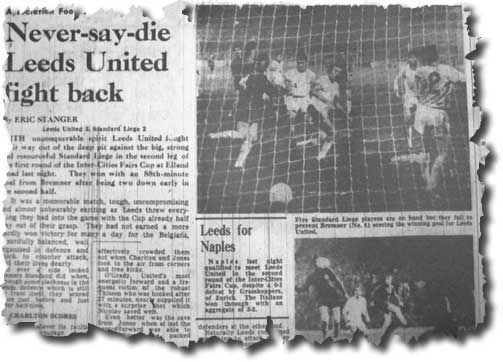 Seven
painfully short days after winning the Inter Cities
Fairs Cup in September 1968 with a 0-0 draw in the Nep Stadium, Leeds
United were off on their defence of the trophy. The two-legged final against
Ferencvaros had been held over to the start of the 1968/69 season because
of fixture congestion the previous campaign and a week after their triumph
in Budapest, Leeds were back in action, pitted against Belgium's Standard
Liege.
Seven
painfully short days after winning the Inter Cities
Fairs Cup in September 1968 with a 0-0 draw in the Nep Stadium, Leeds
United were off on their defence of the trophy. The two-legged final against
Ferencvaros had been held over to the start of the 1968/69 season because
of fixture congestion the previous campaign and a week after their triumph
in Budapest, Leeds were back in action, pitted against Belgium's Standard
Liege.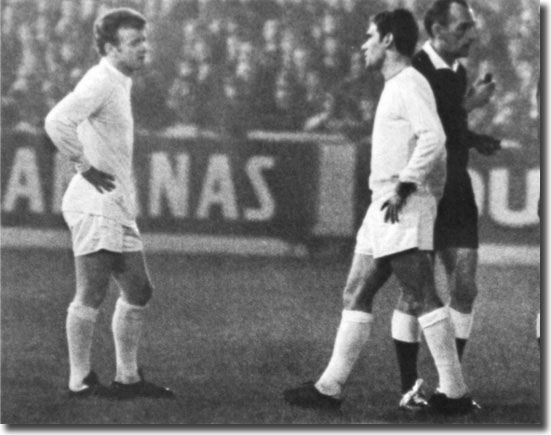 goalkeeper Jean Nicolay won 39 Belgian caps, while Leon Jeck, Nico
Dewalque and Jean Thissen were all regulars in the national side.
goalkeeper Jean Nicolay won 39 Belgian caps, while Leon Jeck, Nico
Dewalque and Jean Thissen were all regulars in the national side.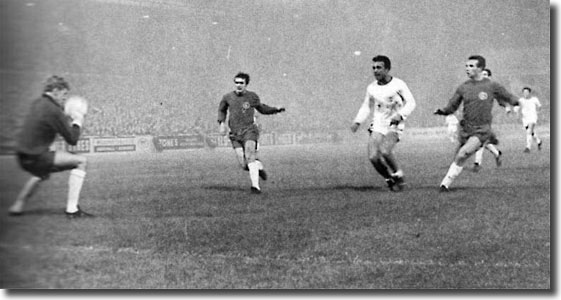 'balanced, well organised in defence and quick to counter attack' (Stanger).
They appeared to have the measure of United, though Mike
O'Grady looked like he might force a breakthrough with his tireless
probing and neat ball control. He came in for some heavy attention from
left-back Thissen, who went into the referee's book after 27 minutes.
'balanced, well organised in defence and quick to counter attack' (Stanger).
They appeared to have the measure of United, though Mike
O'Grady looked like he might force a breakthrough with his tireless
probing and neat ball control. He came in for some heavy attention from
left-back Thissen, who went into the referee's book after 27 minutes.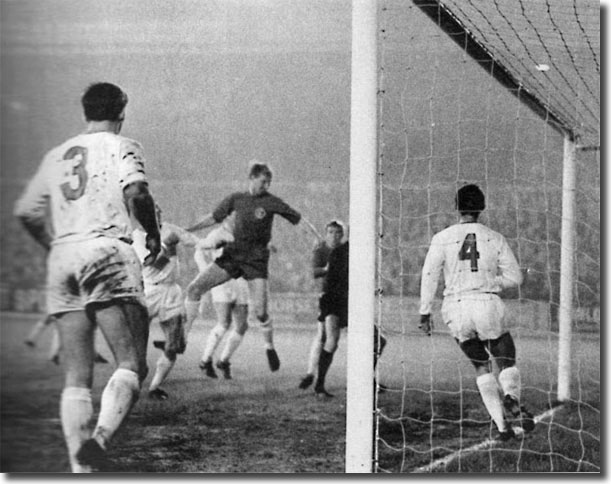 As
it was, they did not have the time to start feeling sorry for themselves
and were back in the game almost immediately, Charlton making partial
amends for his earlier lapse by outjumping everyone to head home a Lorimer
centre.
As
it was, they did not have the time to start feeling sorry for themselves
and were back in the game almost immediately, Charlton making partial
amends for his earlier lapse by outjumping everyone to head home a Lorimer
centre.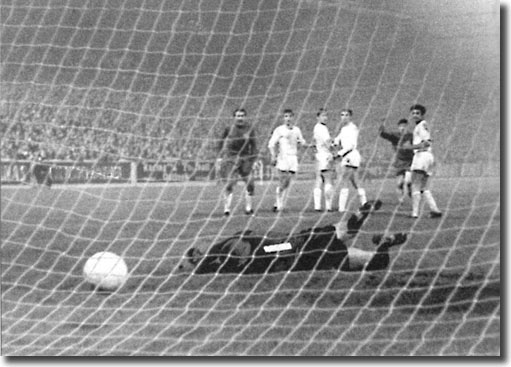 best
bulldog effort yet.'
best
bulldog effort yet.'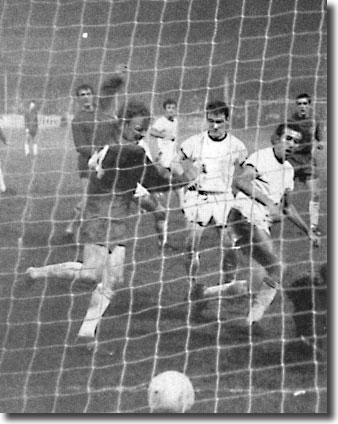 admission
charges in Great Britain are still below continental level except in the
subsidised Communist cities. Football is a business and if the public
do not like the goods they will not buy. Old time "support your local
team" loyalties do not apply as they used to do.
admission
charges in Great Britain are still below continental level except in the
subsidised Communist cities. Football is a business and if the public
do not like the goods they will not buy. Old time "support your local
team" loyalties do not apply as they used to do.